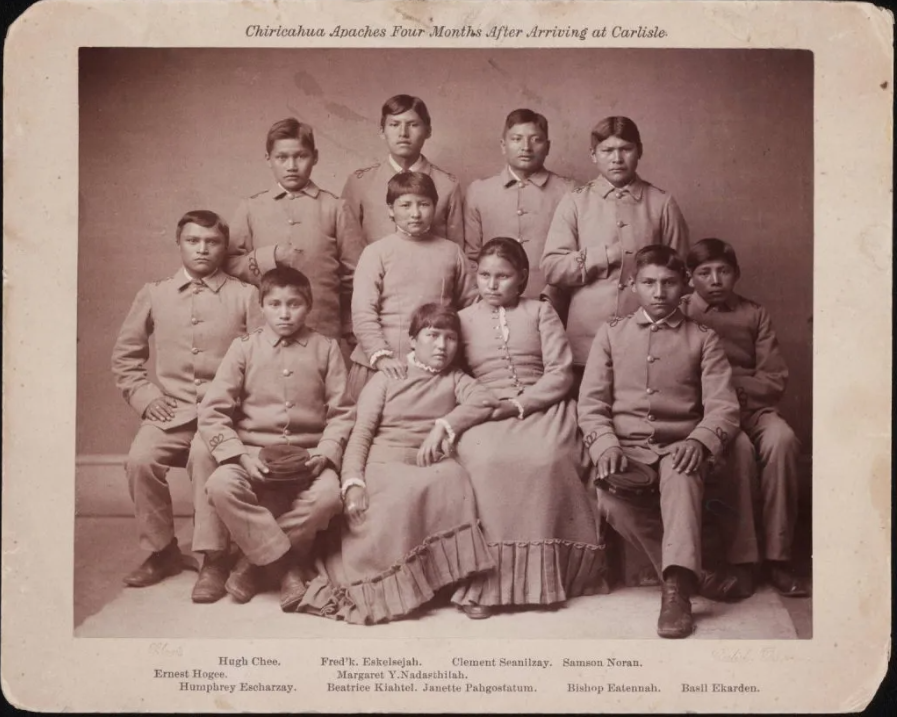
Establish the Truth and Healing Commission on Indian Boarding School Policies Act
For more than two hundred years assimilation processes have been adopted by the United States Government. These policies were intended to strip American Indian, Alaska Native, and Native Hawaiian children of their Indigenous identities, beliefs, and languages. These Indian Boarding School Policies established federally funded, off-reservation, and Christian-run Indian boarding schools. The motto to “kill the Indian in him and save the man” became an unquestioned policy.
According to the National Native American Boarding School Healing Coalition, the Federal Government funded church-run boarding schools for Native children from 1819 through the 1960s. Founded in 1879, the Carlisle Indian Industrial School set a precedent, where more than 10,000 American Indian and Alaska Native children as young as 3 years old were enrolled from more than 140 Indian Tribes. Children were relocated from their traditional homelands to 1 of at least 367 known Indian boarding schools, of which 73 remain open across 30 States. Native children who died while attending Indian boarding schools or neighboring hospitals were buried in unmarked graves or off-campus cemeteries.
In 2018 the United States Commission on Civil Rights published the Broken Promises Report. They found that because of Indian Boarding School Policies, Native communities continue to experience intergenerational trauma resulting from damaged Indigenous identities, and the chronic psychological harm of child separation from their families.
What Does the Church Say?
The United Methodist Church General Conference in 2016 promised that the “United Methodist Church will build bridges of respect and understanding with indigenous persons. Our churches must listen and become educated about the history of the relationship between indigenous persons and Christian colonizers in their own geographic locations. Through prayer and relationship building, they will celebrate the gifts that indigenous people bring to the body of Jesus in the world.”
The Native American International Caucus of the United Methodist Church (NAIC) asks that, “We need to name and confess the complicity of the aggressors, and we need to locate the sites of church-supported schools, to find and list the names of children who have attended these schools and where applicable, their Tribal affiliations, and to determine the geographical and burial location of our children, and the remaining families of these children. Let us break the silence as our children speak the truth once again.”
What can your congregation do to respond?
- Learn where Native boarding schools were located in your area
- Find out if and in what ways your local church contributed directly or indirectly to these boarding schools
- Start a culturally-appropriate dialogue with Native survivors and descendants in your community.
- Hold a letter-writing campaign and ask your members to call their representatives and ask them to support H.R. 5444 | S.2907
Support H.R. 5444 | S.2907: The Truth and Healing Commission on Indian Boarding School Policies Act
This bill was created to fulfill the need for a Federal Commission to account for the Native American children who were forced to attend government and church-run Indian boarding schools whose goals were to eliminate Native culture, religion, and language. There is no data on the number of children who were forced into these schools or the number of children abused or killed in these schools. Additionally, there is an absence of research into the impacts of children being forced into these schools. By passing this legislation, a Federal Commission would be established to not only account for these missing pieces of history but also raise the voices of Native families who were directly impacted by Indian boarding schools.
According to The National Native American Boarding School Healing Coalition, key provisions of the Bill include…
- Examining the location of children
- Documenting ongoing impacts from boarding schools
- Locating church and government records
- Holding culturally-appropriate public hearings to collect testimony from survivors and descendants.
- Institutional knowledge gathering from subject matter experts
- Sharing findings publicly
- Providing a final report with a list of recommendations for justice and healing
By passing this Bill, not only do we bring the historical account of injustice done to the Native American children and families to light, but we also begin the process of healing and justice for this community. The work to be done by this potential commission will ensure that we do not repeat these mistakes of assimilation in today’s governmental practices.
